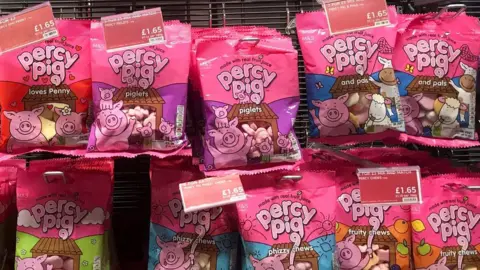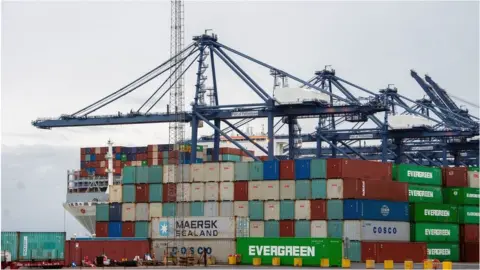Rules of origin: Why are Percy Pigs a headache for M&S?
 Reuters
ReutersWhen the government said it had negotiated a trade deal with the EU with no tariffs (taxes on imports) or quotas (limits on imports) on goods, that wasn't the whole story.
"Rules of origin are a huge area of concern for British manufacturing - from cars to clothing," said Fergus McReynolds from Make UK, the manufacturers' organisation.
"The new trade agreement delivers on duty and quota free trade, but only so long as exports meet stringent local content requirements."
What are rules of origin?
Rules of origin make sure that a company in the UK can't buy cheap products from a country with poor labour standards, change the labels on them and then sell them into the EU tariff-free.
That may sound simple, but according to the boss of Marks and Spencer it really isn't.
He gave the example of the impact the regulations could have on the retailer's Percy Pig sweets, and we'll come back to them later.
 PA Media
PA MediaWhere can parts be made?
The trade deal allows UK manufacturers to use ingredients or parts that have been made in the UK or the EU and not pay any tariffs when they export the finished product to an EU country.
That relies on their ability to prove where all the parts came from, which can be an onerous process. Manufacturers faced with similar free trade deals will often choose to accept the cost of the tariff to avoid the cost of all the paperwork.
For ingredients or parts brought in from outside the UK and the EU, it gets more complicated still, because there are limits to the proportion of the product that can be from outside the free trade area (ie from outside the UK and the EU).
These vary from product to product - the rules take up 50 pages of the trade deal. For example, with honey, the maximum amount that can come from outside the area is 20% of the weight. With meat, absolutely nothing from outside the area is allowed.
With electric cars, from the end of 2026, none of the battery pack will be allowed to be made outside the area.
What about changing the product?
You can get past these rules by processing a product you have brought in from another country (transforming it) so that it is completely different to how it was when you received it.
The rules about how much the product has to be transformed are fiendishly complicated.
For example, painting something is not enough and neither is changing its packaging.
If you dry food to stop it going off that isn't enough - but if you dehydrate it to give it a distinctive flavour or texture such as with sun-dried tomatoes or raisins then that is enough.
James Kane from the Institute for Government says these rules are likely to hit the food sector more than other industries.
"In all other sectors you would probably just pay the tariff," he said, adding that most non-food tariffs are less than 10% while the average food tariff is 14%.
But even a small tariff can cause big problems in industries where margins are tight.
So what about the Percy Pigs?
The boss of M&S was using Percy Pigs as an example of a situation in which it was not yet clear whether a tariff needed to be paid.
The sweets are manufactured and packaged in Germany and then shipped to the UK - no tariffs are payable because of the trade deal.
They are then taken from the M&S warehouses and exported to stores in the Republic of Ireland, which is part of the EU.
 Getty Images
Getty ImagesNow, this is the complicated bit. Because they have left the EU and not been processed enough to count as being made in the UK, it may be that a tariff needs to be paid to get them back into the EU, despite them having been made in the EU in the first place.
If they had been unpacked and put on a cupcake, for example, there would be no tariff because they would have been transformed, but just storing them in the UK is not enough.
It's hard to see why this situation has emerged because it is not obviously in the interests of either the UK or the EU.
Why has this happened?
Anna Jerzewska, founder of the Trade and Borders consultancy, said: "This is a wonderful example of why you would want longer to negotiate a trade deal."
She added that while this is a standard provision for a trade deal, "normally countries negotiating such an agreement would not have such closely-integrated supply chains".
A government spokesman said: "Rules of origin are a standard feature in trade agreements globally and were developed in close consultation with trade associations, businesses and sector experts."



